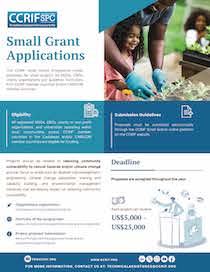26 January, 2010 – The Caribbean Catastrophe Risk Insurance Facility (CCRIF) today paid the Government of Haiti US $7,753,579 following the Magnitude 7.0 earthquake which struck close to Port-au-Prince on 12 January, causing damage of catastrophic proportions. This represents the full amount due to the country based on its catastrophe insurance policy for earthquakes for the 2009/10 policy year, and which forms part of the country’s disaster risk management strategy. This value represents approximately 20 times the premium of US$385,500.
Less than 24 hours after the earthquake occurred, CCRIF determined that the full payout would be effected and the funds were transferred to the Haitian Government today, following the required 14-day waiting period during which the specific calculations were verified. The payout determination was made based on the strength and location of the earthquake as outlined in Haiti’s policy. CCRIF’s design as a parametric insurance facility means that payouts can be calculated and made very quickly because loss adjusters do not have to be relied on to estimate damage after the event, which can take months or even years.
US$8 million is a small amount compared with the needs of the country at this time. However, according to Dr. Simon Young, CEO of Caribbean Risk Managers, CCRIF’s Facility Supervisor, “these funds have been paid directly to the Government and can be used in a way that the Haitian Government deems to be of prime importance at this time.” He continues that “CCRIF will play an active role in the rebuilding of Haiti by assisting in hazard modelling and developing better hazard maps, and will be working with authorities in Haiti to better plan for natural hazards as the people of Haiti are re-settled and the rebuilding process gets underway.”
Through its capacity building and collaborative relationships with regional organisations, CCRIF will continue to help countries to become more proactive in their disaster risk management strategies. In light of the Haitian earthquake, CCRIF will spend time meeting with other members to revisit their own earthquake coverage, as most Caribbean governments have placed greater emphasis on the hurricane component of their disaster portfolio. For example, Haiti’s earthquake coverage was only 15% of its total policy. CCRIF has the capacity to provide substantially more coverage for both earthquake and hurricane events, and does so at a rate of premium that is minimised through pooling and the not-for-profit nature of CCRIF’s operations.
CCRIF also will work with its members to support the establishment of Country Risk Officers (CROs) as a fundamental part of the hazard risk management frameworks. These CROs will be responsible for managing their country’s risk portfolio and enabling the adoption of a holistic approach to risk management before catastrophic events occur, thereby reducing the country’s risk burden and its vulnerability.
CCRIF will continue to keep its members, clients and other stakeholders apprised of the Facility’s actions at this time, and will continue to monitor and contribute to the regional response.
About CCRIF: CCRIF is a risk pooling facility, owned, operated and registered in the Caribbean for Caribbean governments. It is designed to limit the financial impact of catastrophic hurricanes and earthquakes to Caribbean governments by quickly providing short term liquidity when a policy is triggered. It is the world’s first and, to date, only regional fund utilising parametric insurance, giving Caribbean governments the unique opportunity to purchase earthquake and hurricane catastrophe coverage with lowest-possible pricing. CCRIF represents a paradigm shift in the way governments treat risk, with Caribbean governments leading the way in pre-disaster planning.
Sixteen governments are members of the fund: Anguilla, Antigua & Barbuda, Bahamas, Barbados, Belize, Bermuda, Cayman Islands, Dominica, Grenada, Haiti, Jamaica, St. Kitts & Nevis, St. Lucia, St. Vincent & the Grenadines, Trinidad & Tobago and the Turks and Caicos Islands. In 2007, CCRIF paid out almost $1 Million to the Dominican and St Lucian governments after the November 29, 2007 earthquake in the eastern Caribbean, and in 2008, CCRIF paid out $6.3 Million to the Turks & Caicos Islands after Hurricane Ike made a direct hit on Grand Turk.
For more information, contact Simon Young at syoung@caribrm.com / 202-465-4301, CCRIF at pr@ccrif.org or Roddy Langley in the UK at roddy@lysanderpr.com / 07740 633 296.
www.ccrif.org





